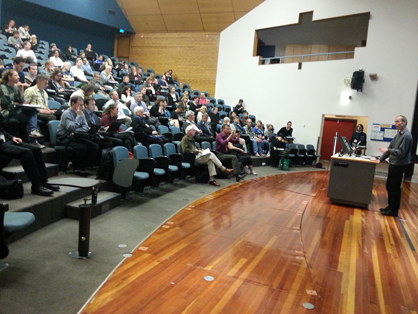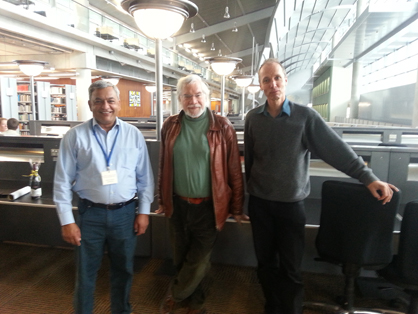
The inaugural conference of the Digital Humanities Otago Research Group “Surveillance, Copyright, Privacy: the end of the open internet” was hosted by the MFCO department 30 January-1 February 2014. The conference was designed to create cross-disciplinary and critical dialogue regarding the intensification of control and policing of internet usage, including both commercial activity and democratic participation in New Zealand.
With more than 20 national and international speakers from a variety of disciplines and perspectives it was an engaging conference exploring various aspects of surveillance and the internet.
The conference generated media interest with articles appearing in the Otago Daily Times (Big Brother will continue to watch, Most NZers not spied on, Focus on internet spying) , Channel 39 News, and Breakfast on TV1.

Keynote speakers (left to right): Vikram Kumar, Graham Murdock, Nicky Hager
Podcasts of the keynote lectures available here
Nicky Hager: Surveillance and Privacy in the Snowden Era
This talk will describe the development of mass surveillance systems during the past generation and New Zealand's part in this story. He will discuss Anglo-American intelligence history, digital electronics and the war-on-terror environment that together have led to a scale of spying that threatens the Internet as we briefly knew it. Digital technology has of course also hugely changed how people live their lives. This talk will look at what privacy means and how we can protect it in this era of on-line lives and Internet surveillance.
Graham Murdock: Surveillance and Secrecy in the Age of Big Data
The roll out of broadband connectivity coupled with the exponential increase in computer capacity has ushered in the age of 'Big Data'.State agencies and commercial companies are recording, aggregating and interrogating every aspect of people's on-line lives, constructing new economic, social, and political classifications of dangerousness, credit worthiness, and compliance. But information flows remain highly asymmetric. While the activities of citizens and consumers are increasingly transparent to governments and major corporations their own intentions and actions remain opaque, concealed behind walls erected to protect 'national security' and 'commercial privilege' and misrepresented by concerted public relations activities designed to promote carefully selected accounts. This produces radical asymmetries in the ability ground strategies of action in informed analysis.
This present paper has three aims. Firstly, it sets out to map the emerging landscape of 'Big Data' and its core dynamics. Secondly, drawing on recent cases of whistleblowing it argues that investigative journalism and critical scholarship are more essential than ever as sources of informed challenge to the abuse of state and corporate power. Thirdly, it explores how these interventions might be supported and advanced in a context where economic and political pressures are combining to undermine their viability.
Vikram Kumar: The View from the Coalface: Surveillance, copyright, privacy in a post-Snowden era
Megaupload, MEGA, and the nascent Internet Party are an important part to understand and respond to Surveillance, Copyright, and Privacy issues. Individually and collectively, these issues are at the heart of society grappling with rapid change thrust upon it by the Internet. Complexity arises from the interplay of technology, governments, and businesses pursuing diverging agendas. What insights and lessons are being learnt at the coalface? How can we use them to think about and forge a future in the post-Snowden era?
